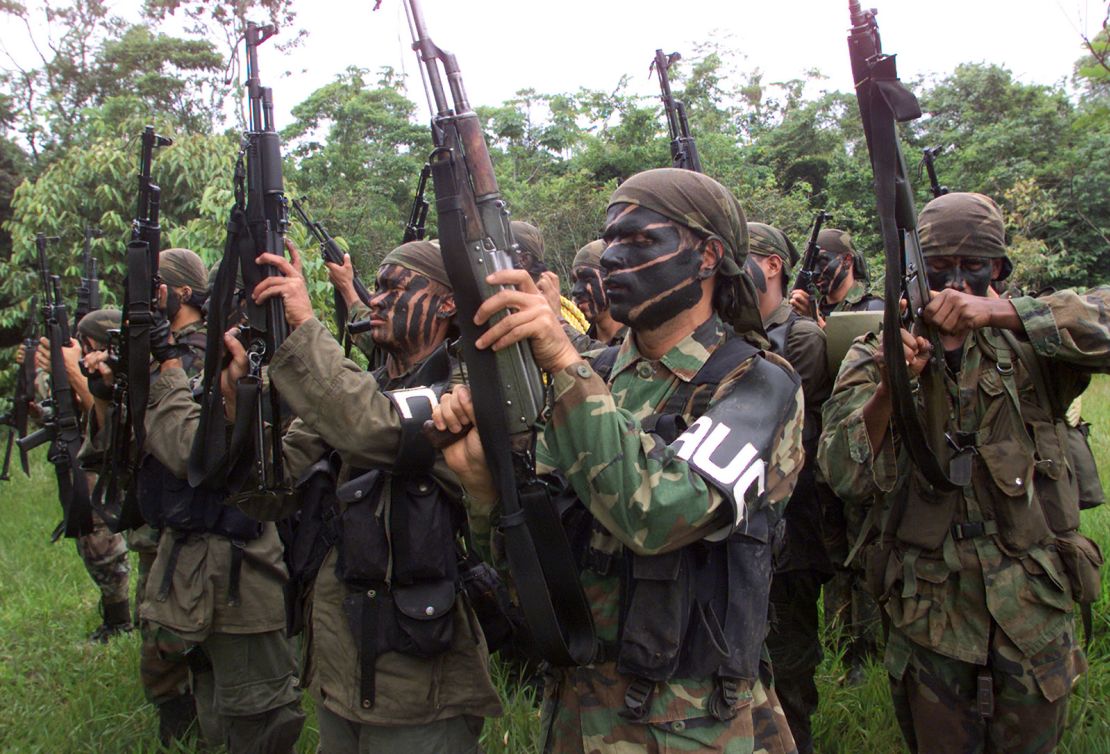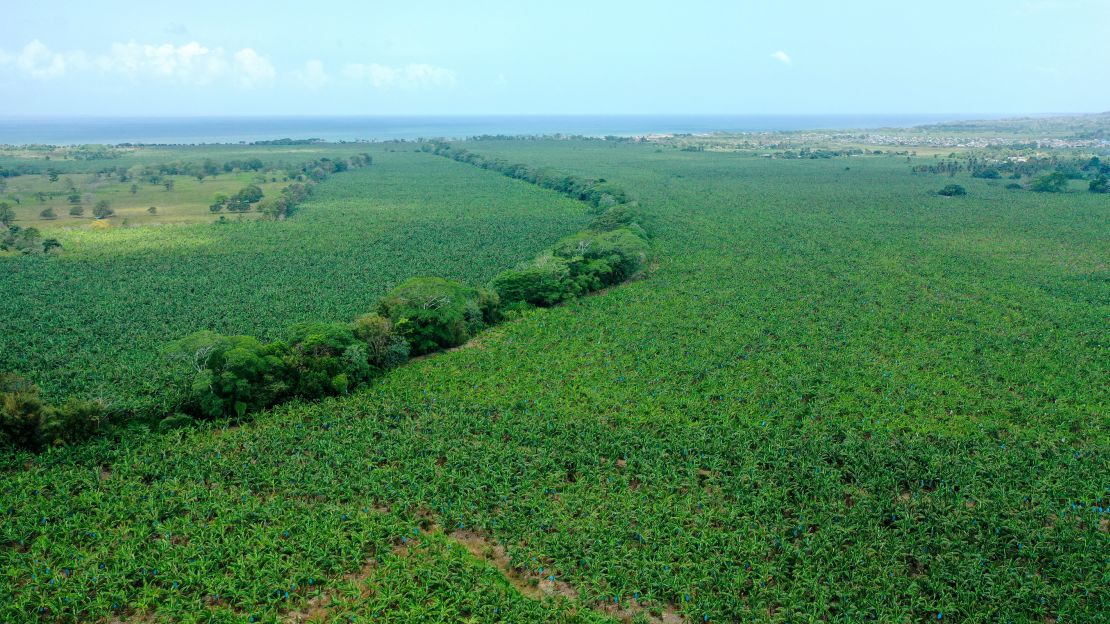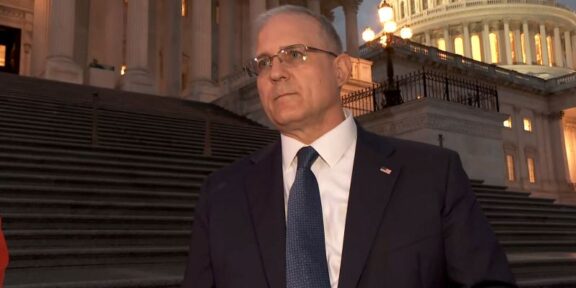Bogota
CNN
—
The execution of banana plantation employee “David” by right-wing Colombian paramilitary members in 1997 was as swift because it was brutal.
Minutes after his bus was stopped at a checkpoint within the coastal area of Urabá, he was dragged off, overwhelmed to dying in entrance of his fellow passengers, and dumped on the facet of the street – the place his killers coated his corpse with a banana plant. Cows would later feed on his physique, based on courtroom paperwork.
The brutality didn’t finish there. His daughter and sister-in-law disappeared weeks later, by no means to be discovered once more. Dying threats have been made to a different member of the household.
What was left of the household quickly left Urabá for good.
He was simply one in every of hundreds of individuals focused by the United Self-Protection Forces of Colombia, or AUC, an notorious right-wing terrorist group that, on the peak of Colombia’s civil battle across the flip of the century, was capable of mobilize tens of hundreds of fighters.
Greater than 1 / 4 century later, a landmark civil case in a US federal courtroom this week discovered banana firm Chiquita Manufacturers Worldwide liable for financing the paramilitary group, and ordered Chiquita to pay $38.3 million in compensation to “David’s” household and people of seven different victims – whose actual identities have been hid in courtroom paperwork.
The small print of these deaths, which came about between 1997 and 2004, and accounts of the affect they’d on the households, have been learn to jurors earlier than they deliberated whether or not Chiquita – one of many world’s largest banana producers – had acted “as an affordable businessperson” by paying the AUC what the corporate characterised as extortion funds.
The households argued that funds from Chiquita to the AUC had helped to prop up the paramilitary group’s violence in Colombia and that the corporate ought to subsequently be held accountable for the group’s murders.
The decision has been celebrated as a authorized breakthrough. Based on the legal professionals who gained the case in Florida, it marks “the primary time an American jury has held a significant US company accountable for complicity in critical human rights abuses in a foreign country.”
“I really feel nice pleasure, we waited for thus lengthy and instantly, we gained. I had virtually misplaced hope, however God helped us,” one of many plaintiffs informed CNN after the ruling.
The mom of 4 daughters recalled telling the courtroom how her companion was killed by AUC paramilitaries on November 14, 2003, to strain the household to promote a banana plantation at beneath market charge.
“I don’t need the cash myself, I’ll be gone quickly… however not less than, for the women: could they get some justice now!” she mentioned of the compensation.
The decision follows an almost two-decade judicial struggle by the households, who sued Chiquita Worldwide after a separate courtroom case in 2007. In that case, the corporate admitted paying $1.7 million in “safety cash” to the AUC – at the moment thought of a Overseas Terrorist Group by the State Division – and agreed to pay the US authorities a $25 million positive.
Nevertheless, it’s unlikely to be the final of the matter, and never solely as a result of Chiquita has already mentioned it should enchantment the decision.
Marco Simons, normal counsel for Earth Rights Worldwide, a human rights NGO that supplied authorized help to the victims, described his authorized technique as a “bellwether course of,” along with his workforce deciding on the 9 strongest instances they’d from over 4,500 complaints. He now hopes many extra instances will observe.

“It’s been an honor to characterize these victims for the previous 17 years. It’s not over but, however this can be a vital step ahead, and we hope that this can pave the best way for compensation for all of the victims,” Simons informed a press convention in Washington on Tuesday.
Due to Chiquita’s enchantment, Simons says it’s unlikely any of the victims will obtain compensation quickly, nevertheless, he says the case has despatched a powerful message to companies about the necessity to respect human rights.
“In the end, this cash just isn’t going to exchange what’s been misplaced. We’re nonetheless speaking about horrific abuses that these households have suffered, however the cash is essential as a result of, sadly, the language that companies perceive greatest is cash. Generally it takes a big financial penalty to vary company conduct,” Simons mentioned.
Chiquita has maintained in its protection – each all through the most recent case and in earlier litigation – that it was itself a sufferer, because it had been compelled to pay the AUC safety cash.
Whereas that argument was not sufficient to persuade the jury that it had acted “as an affordable businessperson would have acted below the circumstances,” the corporate informed CNN following the most recent verdict that it remained “assured that our authorized place will finally prevail.”
“The scenario in Colombia was tragic for thus many, together with these straight affected by the violence there, and our ideas stay with them and their households. Nevertheless, that doesn’t change our perception that there isn’t a authorized foundation for these claims,” the assertion learn.
In its 2007 case towards the US Justice Division, the corporate admitted making greater than “100 funds to the AUC totaling over $1.7 million.” Chiquita recorded the AUC funds as “safety providers,” although the corporate by no means obtained any precise providers from these funds, in accordance to a US Justice Division press launch from the time.
Eric Holder, who represented Chiquita within the 2007 trial earlier than serving as US Lawyer Normal below President Barack Obama, informed the courtroom then that: “The corporate needed to pay a wide range of terrorist teams for over 15 years as a result of these have been the teams that managed the areas during which the corporate operated. Not the Colombian authorities.”
Nevertheless, in that trial, the corporate ended up admitting in a plea deal that it had willingly continued to pay the AUC even after the group was declared a terrorist group by the US authorities in 2001, and even after a senior director lodged an objection to Chiquita’s board reiterating “his robust opinion to promote our operations in Colombia,” because of the safety cash challenge.
Federal attorneys discovered that Chiquita made $49.4 million in revenue from their Colombian operations between 1997 and 2004.
The AUC was based in 1997, throughout one of the tragic phases of the Colombian civil battle, which noticed the federal government wrestle for management towards left-wing guerrilla forces, right-wing paramilitaries, and legal organizations.
Round that point, left-wing guerrillas from the Revolutionary Armed Forces of Colombia (FARC) and the Nationwide Liberation Military (ELN) have been shifting towards the state and terrorizing the civilian inhabitants. Chiquita mentioned within the 2007 case that it had paid ransoms to the FARC and ELN earlier than it turned to the AUC in 1997.

Confronted with the potential of an armed communist revolution within the nation, Colombian landowners and right-wing sympathizers created teams of vigilantes to reply to the guerrillas blow for blow. The AUC have been as soon as such a group and spent the years earlier than their ultimate demobilization in 2006 terrorizing the inhabitants of northern Colombia to stem the rise up.
At its zenith, the AUC may mobilize tens of hundreds of fighters, and was closely financed by drug trafficking: following demobilization, greater than a dozen AUC leaders have been extradited on drug costs to the US.
“I keep in mind that interval, it was actual terror,” one of many plaintiffs awarded compensation on Monday informed CNN. “My husband was killed, however my daughter was additionally raped, you had victims all throughout city.”
In different testimony heard by the jurors in the latest courtroom case, a minor woman was compelled to observe from a taxi as her mom and stepfather have been executed on the facet of the road, earlier than being given the equal of lower than a greenback to return residence and survive as an orphan.
Colombia as we speak is a vastly completely different nation to the one during which the AUC was born.
A couple of years after the demobilization of the AUC, a peace deal in 2016 additionally delivered to an finish the 52-year battle between the federal government and the FARC, although some dissidents proceed to struggle.
Each proper wing paramilitaries and left-wing guerrillas have since been included in transitional justice processes aimed toward bringing closure to among the darkest pages of the battle.
But the concern in Urabá stays.
A few of the AUC’s former members stay at massive and have joined a brand new organized legal group, the Gulf Clan, that challenges authorities management in northwestern Colombia.
Rights teams say highly effective company pursuits proceed to collude with native politicians and legal teams to repress activism, significantly in protection of the atmosphere, which is usually a harmful enterprise in South America.
Even so, for not less than among the many victims of the AUC, this week’s courtroom verdict is a motive for optimism. One of many plaintiffs who spoke with CNN requested to share her message as an act of defiance.
“My daughter, my son, they’re all ‘Mother don’t decide up the cellphone, mother don’t speak.’ However hey, concern can solely final till somebody decides to talk,” she mentioned.











